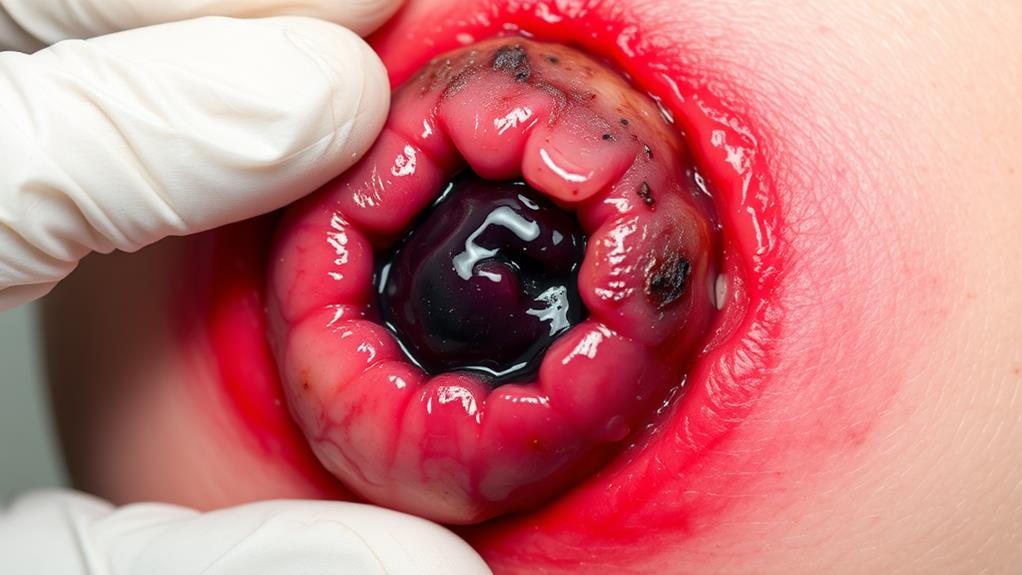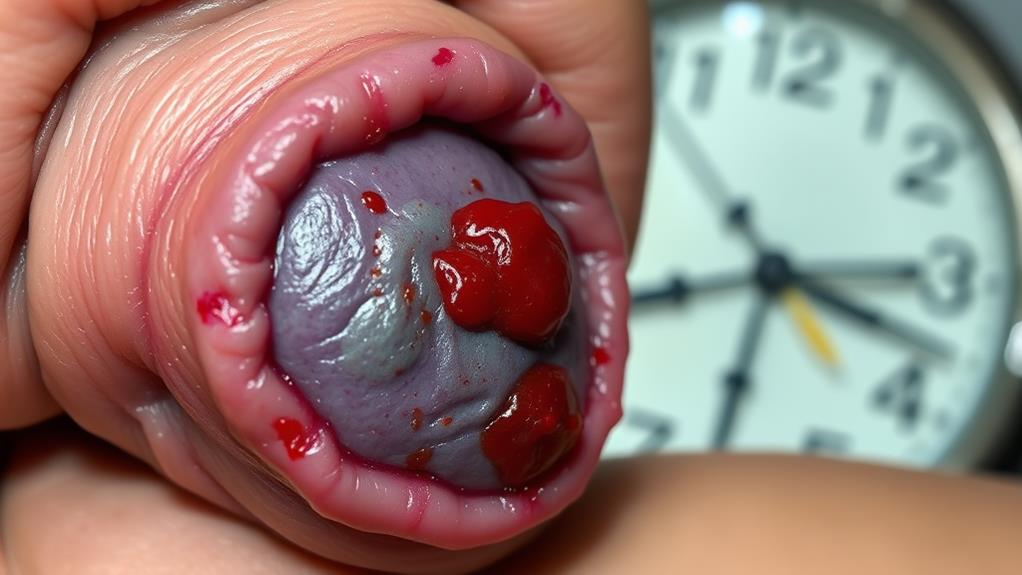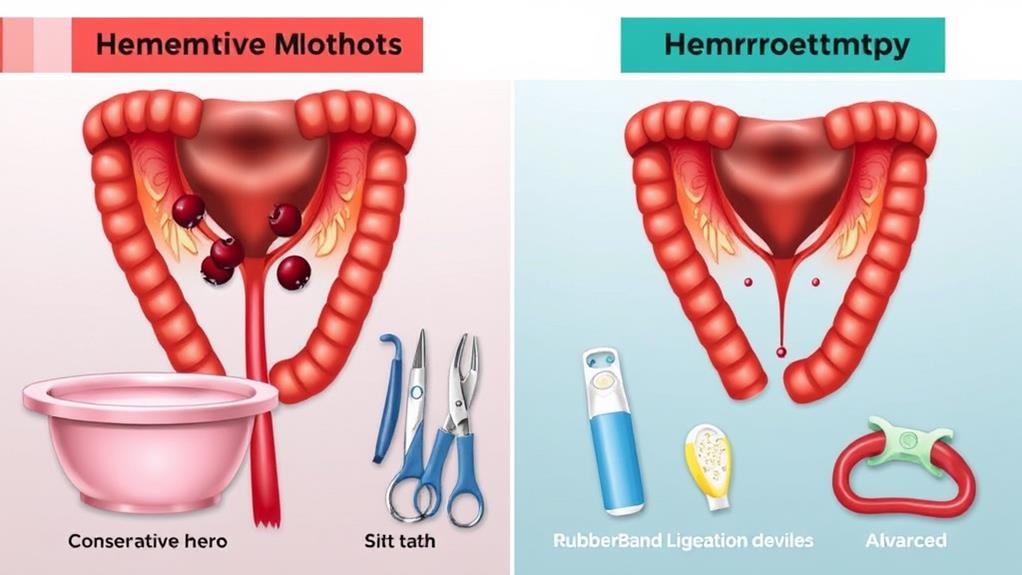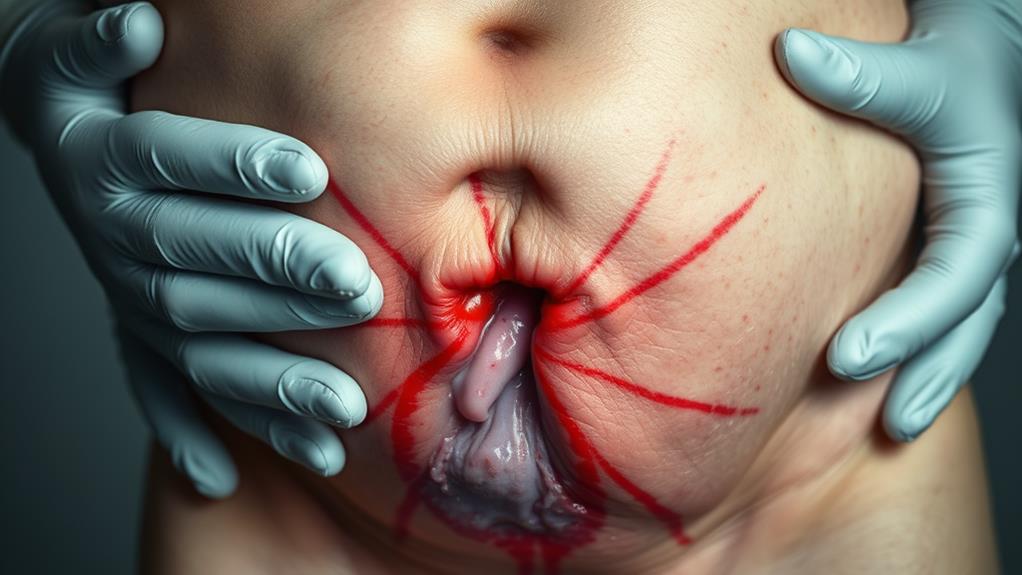As an Amazon Associate I earn from qualifying purchases.
If you're experiencing severe anal pain, excessive bleeding, or symptoms that persist for more than 48 hours, you should seek immediate medical attention for thrombosed hemorrhoids. Don't delay treatment, as it can lead to complications like infections or abscesses. Urgent care is necessary if you have sudden, intense pain or pass black, tarry stools. When you visit the ER, expect a thorough examination and possible blood clot removal if caught early. Remember, prompt medical care can prevent further issues and reduce recovery time. Exploring treatment options and prevention strategies can help you manage this condition effectively.
Understanding Thrombosed Hemorrhoids

Thrombosed hemorrhoids are a painful and potentially serious condition that occurs when a blood clot forms inside a hemorrhoid. These clots can develop in both internal and external hemorrhoids, but they're more common and problematic in external ones. When you have a thrombosed hemorrhoid, you'll likely experience severe anal pain, swelling, and inflammation in the anus and rectum area.
You might notice intense discomfort during bowel movements, accompanied by rectal bleeding and itching. The pain from a thrombosed hemorrhoid is typically much more severe than that of regular hemorrhoids. It's vital to understand that if left untreated, this condition can lead to serious complications. These include infections, abscesses, and in rare cases, even life-threatening sepsis.
Don't ignore the symptoms of a thrombosed hemorrhoid. If you suspect you have one, seeking prompt medical attention is imperative. A healthcare professional can diagnose the condition and recommend appropriate treatment options. In many cases, surgical removal of the blood clot is the most effective way to alleviate symptoms and prevent further complications.
Symptoms Requiring Urgent Care
When dealing with thrombosed hemorrhoids, it's essential to recognize symptoms that require urgent medical attention. Severe pain is a key indicator that you need immediate care, as it often signals a thrombosed hemorrhoid that demands prompt treatment. Don't ignore sudden, intense anal pain, as it's a clear sign that you should seek medical help quickly.
Bleeding is another pivotal symptom to watch for. If you experience:
- Excessive rectal bleeding
- Unexplained rectal bleeding
- Vomiting blood or passing black, tarry stools
These are all red flags that warrant an emergency room visit. Such bleeding can indicate serious complications or underlying conditions that need immediate medical intervention.
Risks of Delaying Treatment

Numerous risks accompany the delay of treatment for thrombosed hemorrhoids. By postponing medical care, you're exposing yourself to increased pain, swelling, and a higher risk of infection. Delaying treatment can notably prolong your recovery time and boost the likelihood of recurrence, making it vital to see a doctor promptly.
One of the most serious complications of untreated thrombosed hemorrhoids is the formation of a perianal abscess. This painful collection of pus may require surgical drainage, further complicating your condition. In rare but severe cases, delaying treatment can lead to sepsis, a life-threatening condition that occurs when your body's response to infection spirals out of control.
Moreover, putting off medical care can mask symptoms of other serious conditions, such as colon cancer or inflammatory bowel disease. By seeking timely primary care, you'll not only address your immediate hemorrhoid concerns but also confirm that any underlying issues are identified and treated promptly. Don't risk your health by delaying treatment – consult a healthcare professional as soon as you notice symptoms of thrombosed hemorrhoids to avoid these potentially dangerous complications.
Emergency Room Expectations
If you find yourself heading to the emergency room for thrombosed hemorrhoids, knowing what to expect can help ease your anxiety. Upon arrival, you'll discuss your medical history and symptoms with the ER staff to determine the best course of action. They'll then examine your anus and rectum using specialized tools like an anoscope or proctoscope to diagnose your condition.
To make the examination and treatment more comfortable, you'll receive a local pain reliever. If you've sought help within 48-72 hours of symptom onset, the ER team may remove the blood clot to provide immediate relief. This procedure can be performed in the emergency room or as an outpatient treatment.
Throughout your visit, you can expect:
- A thorough examination of your anus and rectum
- Administration of local anesthetics for pain management
- Discussion of treatment options and follow-up care
After diagnosis and treatment, the ER staff will provide guidance on further care and management of your thrombosed hemorrhoids. They'll guarantee you're equipped with the knowledge to continue your recovery at home and advise when to seek additional medical attention if necessary.
Treatment Options and Procedures

Treatment options for thrombosed hemorrhoids vary depending on the severity and duration of symptoms. If you seek medical attention within 48-72 hours, blood clot removal can ease your pain. This procedure is typically pain-free, thanks to local anesthetic. Your doctor will make a small incision to remove the clot, and stitches are usually unnecessary.
For thrombosed hemorrhoids older than 72 hours, home treatments are often recommended. These include warm baths, ointments, suppositories, and witch hazel compresses to soothe symptoms. Your doctor may also prescribe medications to reduce swelling and ease bowel movements.
In more severe cases, additional treatment options include:
| Procedure | Description | Recovery Time |
|---|---|---|
| Coagulation | Uses heat to remove hemorrhoids | 1-2 weeks |
| Rubber-band ligation | Cuts off blood supply to hemorrhoid | 1-2 weeks |
| Surgery | Removes hemorrhoid tissue | 2-3 weeks |
In emergency situations, surgery may be necessary to remove the thrombosed hemorrhoid. Prompt medical attention can help prevent complications and reduce the risk of other diseases. Remember, early intervention often leads to better outcomes and faster relief from symptoms.
Prevention and Aftercare Strategies
Focusing on prevention and proper aftercare can substantially reduce your risk of developing thrombosed hemorrhoids and help manage existing ones. You can start by incorporating high-fiber foods into your diet, such as fruits, vegetables, and whole grains. If you're struggling to get enough fiber, consider adding fiber supplements to your routine. Don't forget to drink plenty of water, aiming for 8-10 glasses daily, to soften your stool and promote regular bowel movements.
Regular exercise, like brisk walking, can also help prevent thrombosed hemorrhoids by promoting healthy digestion. Maintain a healthy weight through diet and exercise to reduce pressure on your rectal veins. When using the toilet, avoid prolonged sitting and take regular breaks.
For aftercare and home remedies, consider:
- Taking sitz baths to soothe discomfort
- Using over-the-counter stool softeners to ease bowel movements
- Applying ice packs to reduce swelling and pain
Frequently Asked Questions
When to Go to the Hospital for a Thrombosed Hemorrhoid?
You should go to the hospital for a thrombosed hemorrhoid if you've exceeded your pain threshold or notice emergency signs like severe bleeding. Seek immediate care if symptoms worsen. Your doctor's advice may include surgery options for relief.
How Do You Know When a Hemorrhoid Needs Medical Attention?
Pain and relief, discomfort and ease – you'll know it's time for medical attention when your hemorrhoids cause painful lumps, rectal bleeding, or severe anal itching. Watch for changes in bowel habits and struggles during toilet time.
Will the Er Drain a Thrombosed Hemorrhoid?
Yes, the ER can drain a thrombosed hemorrhoid as an emergency procedure. It's a quick relief option for severe pain. Your doctor will diagnose and advise on surgical options or alternative treatments. Always seek medical advice for proper pain management.
Should You Ever Go to the ER for Hemorrhoids?
You should go to the ER for hemorrhoids if you're experiencing severe pain, excessive bleeding, or other emergency signs. Consider your pain threshold, hemorrhoid history, and symptom duration. Don't rely on self-diagnosis or online research; seek a doctor's advice.
Conclusion
Don't sit on your hands when it comes to thrombosed hemorrhoids. You've learned the warning signs, risks, and treatment options. If you experience severe pain or excessive bleeding, seek immediate medical attention. Remember, early intervention can prevent complications and provide relief. By following prevention strategies and proper aftercare, you'll be back on your feet in no time. Take charge of your health and don't let hemorrhoids be a pain in the rear!
Amazon and the Amazon logo are trademarks of Amazon.com, Inc, or its affiliates.
